Rushing the Clock:
Cherokee Bible Project Races to Preserve Culture
| By Emily Adair Pinckneyville Press 24 June 2015 A local pastor and his colleagues are “rushing the clock” to save the Cherokee language. Brian Wilkes, of the Four Rivers Native American Church of Pinckneyville, is largely the public face for the Cherokee Bible Project. The Bible Project completed a digital translation of the New Testament in spring and is currently working on the Old Testament. “Historically, the New Testament has been used as a way to help study the language,” Wilkes said, “because they used a level of the language that was very defined, very elegant. Just like everybody does when they translate the Bible, they try to put their best into it, and so did the Cherokees.” The New Testament was initially translated by 1860, according to Wilkes. He said many of the 85 Cherokee characters can look similar in tiny print, especially if there’s a smudge on the page, so the Cherokee Bible Project started with the goal of updating the existing material. This included checking the grammar, digitizing the materials and creating a large-print version. All together, the 27 books of the New Testament took approximately two years to retype and publish. Wilkes and his colleagues, however, are doing original translations now, because only pieces of the Old Testament are known to have been translated previously. He anticipates this project will take three to five years to complete. His motivation stays strong, though. Wilkes said he started working with the Cherokee language in 1996. At that time, there were approximately 20,000 fluent speakers. Six short years later, there were 10,000 fluent speakers. “When a language dies, so does a culture,” Four Rivers President Joyce Rheal said. “So we’re trying not only to preserve a language; we’re trying to preserve a culture.” In the last 13 years, there has been a massive push in schools and communities to use the language while they still could. According to Wilkes, there are now about 2600 fluent speakers. A study more than a decade ago found that there were no fluent Cherokee speakers under the age of 40. “You can do your math and realize you’re a generation away from extinction,” Wilkes said. He said many people know they have a connection to the Cherokee people, but they do not necessarily know the history, language or culture. Wilkes has documented his own lineage back to Croatoan heritage, though he also suspects he has some Creek and Cherokee roots. Despite his experience with the Cherokee culture, even he has a lot to discover. “I call it (the Native American Church) the biggest denomination nobody’s ever heard of,” Wilkes said. “Comparing Native American philosophy, culture, ethics to what you see at a powwow is kind of like going to a Catholic Church fundraising carnival and thinking you understand 2,000 years of Vatican history. There’s always more to be learned.” Wilkes earned a bachelor’s degree in education and a bachelor’s and a master’s degree in ministry. He is working on his PhD now, and he recently | received an honorary doctorate for his Cherokee preservation work from the Wolsey Hall School of Theology in Oxford, England. Wolsey Hall also awarded Rev. Johannah Tsasuyeda Meeks Ries of North Carolina the same Doctor of Humane Letters degree for her work with the Cherokee Bible Project.Wilkes’ healing work at Four Rivers incorporates Native American practices, but many of the church members, including the three officers, identify as Christians. “At our local chapter here, most of our people are Cherokee mix bloods who grew up in some Christian denomination and still consider themselves Christian, but also feel at home expressing that in Native tradition, Native language, Native songs and don’t see a conflict.” The church, which is part of the Carbondale Interfaith Council, does not ask its members to give up their other church memberships or re-baptize. Four Rivers offers practical knowledge, including the upcoming meeting’s discussion of healing plants and what the time of the year means. Wilkes said even an atheist could feel welcome and learn something new. Wilkes said the international recognition of the Cherokee Bible Project has made a lot of people take a second look at the church and the motivations behind the project. “About 30 years ago, one of my teachers said to me, ‘I won’t live to see this, but you’ll live to see a time when what people think of Native American history and culture will change completely. And they’ll begin to understand just how extensive it was and just how ancient it is.’” Wilkes said. “I’ve lived to see that.” |


 RSS Feed
RSS Feed